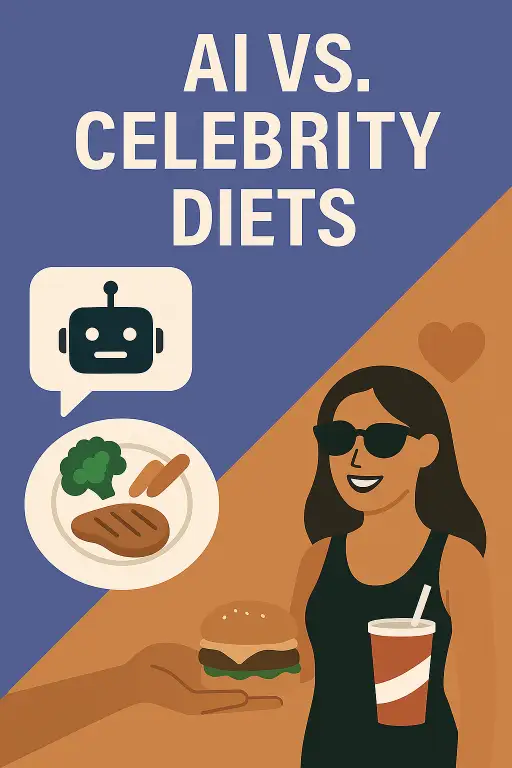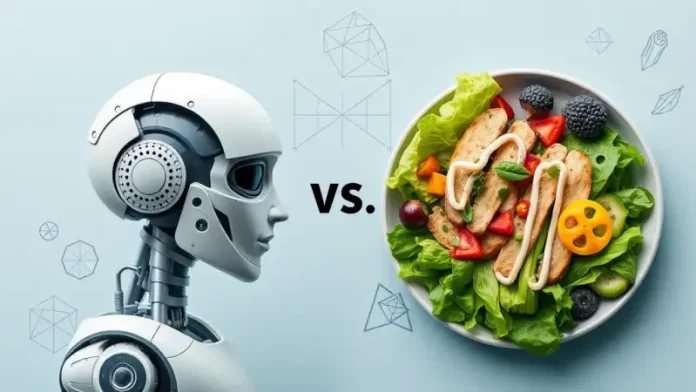Burning fat. Specifically, the lightning-fast kind. the quest for that quick transformation is more intense than ever. On one side, we have the sleek, data-driven promise of Artificial Intelligence (AI), crafting personalized diet and fitness plans. On the other? The ever-glamorous, often-imitated world of celebrity diets, splashed across our feeds with tantalizing before-and-afters.
So, who wins the race to a leaner physique? Is it the algorithm or the A-lister? And more importantly, is “faster” even the finish line we should be sprinting towards? Grab your green juice (or maybe just a glass of water), and lets dissect this. Which approach truly burns fat faster, and which one will leave you feeling genuinely good, long after the initial hype fades?
Table of Contents
The Rise of the Machines: AI-Powered Diet & Fitness
First, let’s peek under the hood of AI diet plans. We’re not talking about some generic calorie counter here. Modern AI in nutrition and fitness aims to be your hyper-personalized coach. Think apps and platforms that:
- Analyze data from your wearables (smartwatches, fitness trackers).
- Potentially incorporate genetic information or bloodwork (with your consent, of course!).
- Learn your food preferences and tolerances through detailed logging.
- Use algorithms to create dynamic meal plans, grocery lists, and workout routines tailored to your specific goals, body composition, and even how you’re responding day-to-day.
- Offer 24/7 feedback (via the app) and adjust your plan on the fly.

The “Pros” for Fat Loss (Theoretically):
- Hyper-Personalization: This is AI’s biggest trump card. It can move beyond one-size-fits-all advice to craft something genuinely unique to you.
- Data-Driven Decisions: Plans can be optimized based on actual data your activity levels, sleep patterns, reported energy, etc. not just guesswork.
- Adaptability: As you progress or your needs change, a sophisticated AI should adapt your plan. Feeling sluggish? It might tweak your macros. Plateauing? It could adjust workout intensity.
- Consistency & Accessibility: The app is always there, potentially boosting adherence through reminders and tracking.
- Efficiency: By fine-tuning various factors, AI could theoretically create a more efficient path to fat loss by minimizing wasted effort on unsuitable strategies.
But Hold Your Horses – The Caveats of AI Coaching:
- Data Privacy: You’re feeding it a lot of personal information. Where is it going? How secure is it? These are legit concerns.
- Algorithm Accuracy & Nuance: AI is only as good as its programming and the data it’s trained on. Can it truly understand the complexities of human metabolism, emotional eating, cultural food contexts, or an undiagnosed health issue? The algorithms potential are vast, but still developing and may lack the intuitive wisdom of an experienced human professional.
- Cost & Accessibility: Advanced AI platforms and the necessary wearables can be expensive.
- Over-Reliance on Tech: Can it lead to a disconnect from our own body’s signals if we’re always looking to an app for answers?
- The “Human Touch”: Sometimes, you need empathy, encouragement, or tough love from a real person, not a notification.
The A-List Approach: Decoding Celebrity Diets
Now, let’s switch channels to the dazzling world of celebrity diets. These are the eating plans that go viral because a famous actor, musician, or influencer credits them for their seemingly miraculous transformation. Think ultra-low-carb, juice cleanses, specific food-combining rules, or diets built around expensive, often branded, supplements.
The “Pros” (Why They’re So Seductive):
- Aspirational Motivation: “If they can look like that, maybe I can too!” The power of celebrity endorsement is undeniable.
- Simplicity (Often Deceptive): Many celeb diets have very clear, often restrictive, rules. “Eat this, not that.” This can feel easier to follow initially than nuanced nutritional advice.
- Rapid Initial Results (Often Water Weight): Extreme restrictions can lead to quick drops on the scale in the first week or two, which feels like fast fat loss and is highly motivating. It’s often just water and glycogen, though.
The Red Carpet of Risks – The Downsides of Following a Star:
- Lack of Scientific Backing: Many of these diets are fads, not based on robust, peer-reviewed nutritional science. Many of these diets lacks long-term studies and rigorous testing.
- Nutritionally Unbalanced & Overly Restrictive: Cutting out entire food groups (like carbs or fats) or drastically slashing calories can lead to nutrient deficiencies, muscle loss (you want to lose fat, not precious muscle!), fatigue, and a host of other health issues.
- Unsustainable “Quick Fixes”: Can you really drink only cabbage soup for the rest of your life? Probably not. These diets are notoriously difficult to maintain, leading to the classic yo-yo dieting cycle lose weight fast, regain it (often more) even faster.
- One-Size-Fits-Disaster: What supposedly worked for a celebrity (who likely has access to personal chefs, trainers, fantastic genetics, and maybe even a bit of Hollywood “magic”) is highly unlikely to be suitable, effective, or even safe for the average person with a different lifestyle, body type, and health profile.
- Risk of Disordered Eating: The restrictive nature and intense focus on “good” vs. “bad” foods can foster an unhealthy relationship with food and body image.
- Who’s REALLY Behind the Diet?: Was it the celebrity themselves, their (possibly unqualified) “guru,” or a team of actual registered dietitians? The transparency is often murky.
The Fat-Burning Speed Showdown: Who Crosses the Finish Line First?
Okay, the million-dollar question: AI vs. Celebrity Diets – which burns fat faster?
If by “faster” you mean seeing the number on the scale plummet in the first 7-14 days, some celebrity diets might give you that illusion. Drastic calorie cuts and carbohydrate restriction lead to rapid loss of water weight and glycogen stores. It looks like incredible progress. But is it real fat loss? And is it healthy or sustainable? Almost always, no.
An AI-powered plan, if designed well for healthy and sustainable fat loss, would likely aim for a more moderate pace perhaps 0.5 to 1 kg (1-2 pounds) of actual fat loss per week. This might seem slower initially, but it’s far more likely to:
- Preserve muscle mass: Crucial for a healthy metabolism and body composition.
- Be nutritionally adequate: Keeping you healthy and energized.
- Be sustainable: Building habits you can maintain long-term.
So, while a celeb diet might win a hypothetical “10-day sprint” in terms of sheer scale weight reduction (much of it not being fat), a well-crafted AI plan is designed for the marathon of lasting, healthy body composition change. One’s a quick fix with a high chance of burnout and rebound; the other, a more steady, potentially more enduring approach.
Personalization: The Not-So-Secret Sauce
Here’s a truth bomb: there is no single “best” diet for everyone. We are all incredibly unique. Our genetics, metabolism, activity levels, food preferences, cultural backgrounds, existing health conditions, stress levels, and even our gut microbiomes (something science is still furiously researching!) all play a massive role in how our bodies respond to different foods and exercise.
This is where AI diet plans have a theoretical edge. Their entire premise is built on leveraging your personal data to create a tailored strategy. The more accurate and comprehensive the data input, the more personalized (and potentially effective) the output could be.
Celebrity diets, on the other hand, are the epitome of a one-size-fits-all (or rather, one-size-fits-the-celeb) approach. They completely ignore individual variability, which is why they so often fail for the general public, and can sometimes even be harmful.
The Indispensable Human Element (Even in an AI World)
As impressive as AI is becoming, it’s crucial to remember it’s a tool. The best-case scenario for AI in nutrition, especially for fat loss, often involves a human-in-the-loop. This could mean:
- Registered dietitians and exercise physiologists designing and validating the AI’s algorithms.
- Human coaches available through the AI platform to provide support, answer nuanced questions, and offer empathy.
- Using AI as a tool alongside consultations with your doctor or a qualified nutritionist, especially if you have underlying health conditions, a complex medical history, or a history of eating disorders. Relying solely on tech without considering human nuance are risky for some.
AI can process data incredibly well, but a skilled human professional brings intuition, empathy, and the ability to see the bigger picture of your life and health.
Making an Informed Choice for Your Fat Loss Journey
So, how do you navigate this landscape?
- Be Super Skeptical of Celebrity Diets: Ask critical questions. Is it backed by science or just an anecdote? Is it overly restrictive? Does it promise results that sound too good to be true (they probably are)? Does it require you to buy special products? Who are actually qualified to give diet advice?
- Investigate AI Platforms Carefully: If you’re considering an AI diet coach, look for:
- Evidence-Based Foundations: Is the AI built on sound nutritional principles?
- Transparency: How is your data used and protected?
- Expert Involvement: Are qualified health professionals involved in its creation or oversight?
- Real User Reviews: (Not just paid influencer posts).
- Holistic Approach: Does it encourage balanced eating, regular activity, sleep, and stress management, or just extreme restriction?
- Prioritize Principles Over Named Diets: Whether AI-guided or not, successful and healthy fat loss usually boils down to some core tenets:
- A sustainable calorie deficit (eating slightly less energy than you burn).
- Adequate protein intake (to preserve muscle and promote satiety).
- Plenty of fiber from fruits, vegetables, and whole grains.
- Healthy fats.
- Regular physical activity, including strength training.
- Sufficient sleep and stress management.
- Many celebrity diet claim to be revolutionary but often just repackage these principles with extreme twists.
- Listen to Your Body: No diet, AI or otherwise, should make you feel consistently awful, deprived, or obsessive.
- When in Doubt, Consult a Pro: A registered dietitian or a doctor can provide personalized, safe, and effective advice tailored to your specific health needs.
The Verdict: Algorithm vs. A-Lister – Who Really Wins?
When it comes to the question of “which burns fat faster?”, some celebrity diets might give the illusion of speed through rapid initial (but often unhealthy and unsustainable) weight loss. It’s often smoke and mirrors, focusing on scale weight rather than true, healthy fat reduction.
A well-designed AI diet plan has the potential to guide you towards more sustainable, healthier, and ultimately more effective fat loss because it can be personalized and adapt to your body’s unique responses. AI’s ability to process data are impressive and improving constantly. However, the quality and ethical considerations of AI platforms vary wildly, and the technology is still evolving.
Ultimately, the “winner” isn’t about speed at all costs. It’s about finding an approach that respects your individual biology, promotes overall health, is sustainable in the long run, and helps you build a positive relationship with food and your body. Chasing the “fastest” fix often leads to a dead end. Instead, focus on building consistent, healthy habits. Whether you use AI as a tool in that journey or rely on other evidence-based strategies, remember: consistency and a balanced approach wins the race every times.

